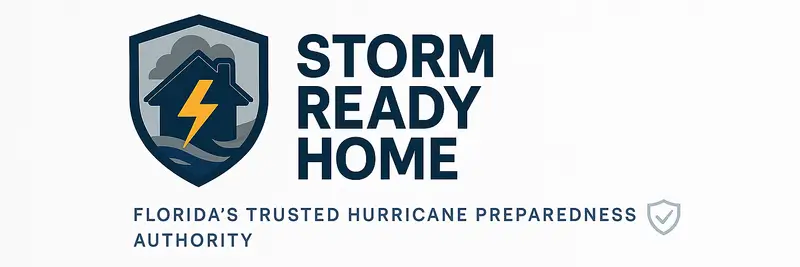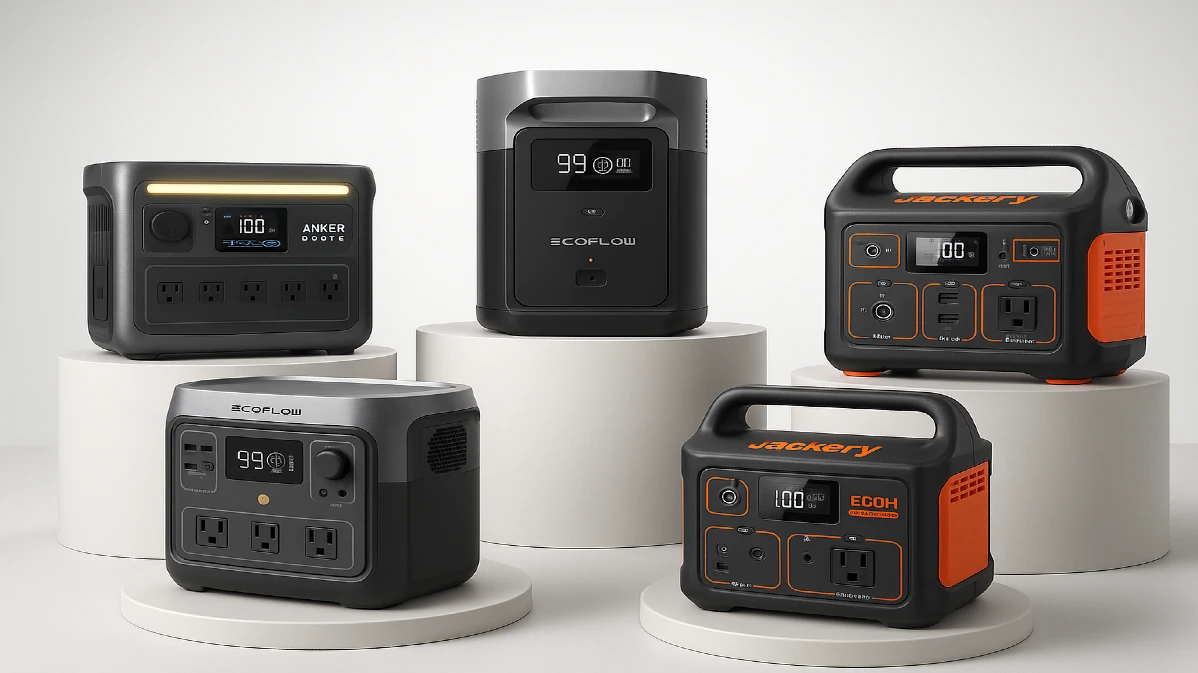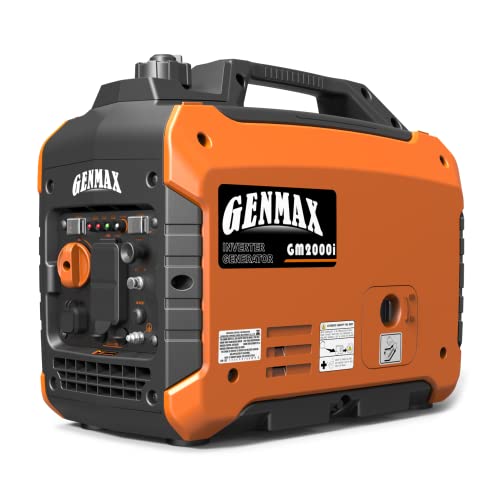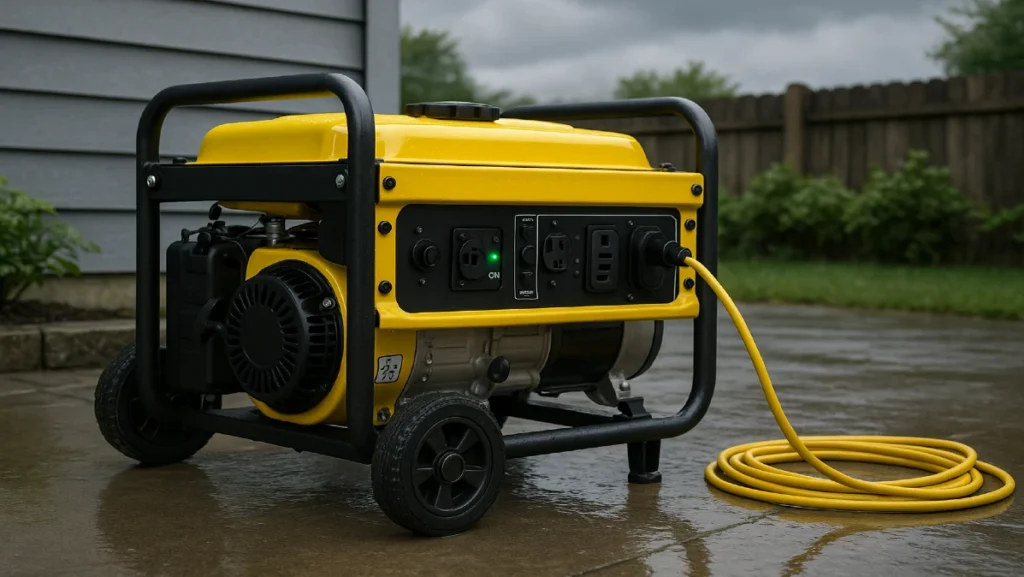
When storms hit and the power grid fails, having the right gas emergency generator gear can be the difference between discomfort and control. Whether you need to keep your fridge running, power essential medical devices, or stay connected during a blackout, this page helps you find the right solution—no matter your budget or home size.
🧮 Gas Generator Calculator
Use our interactive calculator below to find your perfect match based on what you want to power and how long you plan to run it each day.
⛽ Gas Generator Sizing Calculator
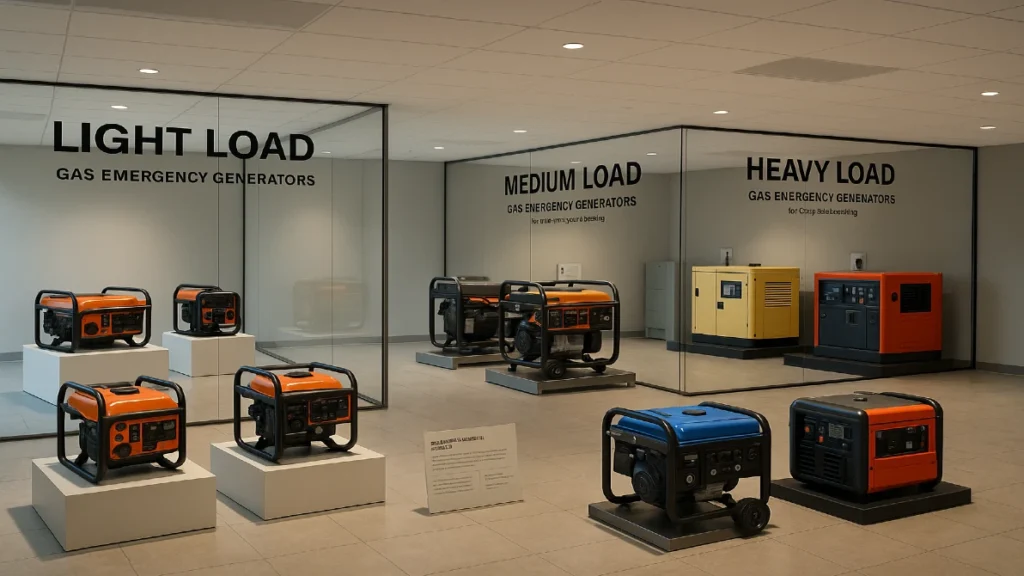
Top Light Load Gas Emergency Generators – Expert Picks for Quiet, Reliable Backup Power
When it comes to safeguarding your home or apartment during unpredictable storms and blackouts, choosing the best portable gas generator for light loads is crucial. Our top-rated selection features industry-leading inverter generators renowned for their quiet operation, exceptional fuel efficiency, and reliable performance. These compact powerhouses deliver the peace of mind you need to protect your sensitive electronics, essential appliances, and medical devices—without the noise or hassle of larger units.
Why trust our expert recommendations? Each model below is handpicked for its robust safety features, energy-saving technology, and outstanding customer satisfaction. Whether you need a quiet emergency generator for apartments, a fuel efficient inverter generator for camping, or a lightweight backup for daily essentials, these generators are rigorously tested to deliver top-tier results when it matters most.
WEN 56200i 2000-Watt Gas Powered Portable Inverter Generator
- Trusted as one of the best quiet inverter generators for emergency home backup
- Extremely quiet (only 51 dB) for residential and apartment use
- EPA III and CARB compliant—clean, safe power for sensitive devices
Portable Inverter Generator 2500W Gas Powered, Long Runtime Gas Generator
- High-efficiency, fuel saving portable gas generator for extended outages
- Lightweight and easy to move—perfect for small homes or travel
- Low-noise operation minimizes disturbance
GENMAX Portable Generator, 2500W Ultra Quiet Gas Digital, EPA Compliant
- Leading the pack in ultra quiet emergency generators
- Advanced eco-mode for maximum fuel efficiency
- EPA compliant—ideal for both indoor and outdoor emergency use
PowerSmart 2500-Watt Portable Inverter Generator with Quiet Technology
- Renowned for dependable, quiet emergency backup power
- Touch-start technology for easy, hassle-free operation
- Compact and powerful—built for critical home essentials
A-iPower SUA2000iD 2000 Watt Portable Inverter Generator Gas & Propane
- Dual-fuel inverter generator for flexible emergency power (gas or propane)
- Portable and rugged, ideal for home or outdoor backup
- Long runtime and robust safety features
AMEGUN 2500-Watt Gas Powered Portable Inverter Generator, CO Sensor
- Advanced safety with integrated CO sensor for peace of mind
- Lightweight and user-friendly—perfect for apartments or travel
- Reliable fuel efficient inverter generator with simple maintenance
Pro Tip from the Experts: For safety, always use your emergency generator outdoors in a well-ventilated area and store extra fuel in approved containers. Investing in the right portable inverter generator now ensures your critical needs are covered during any outage—without compromise.ted area, and store extra fuel in approved containers for safe, reliable emergency power.
- Dimensions: 18″ x 11″ x 18″ | Weight: 48 lbs
- Noise Level: 53 dB operation
- EPA III and CARB Compliant 79.7 cc 4-stroke OHV engine produces 2000 surge watts and 1600 rated watts
- 𝗣𝗼𝘄𝗲𝗿𝗳𝘂𝗹 𝗢𝘂𝘁𝗽𝘂𝘁: 2500 peak watts and 1800 running watts, gas powered by 79.8CC 4-stroke OHV engine, 1.1 gallon fuel tank…
- 𝗠𝘂𝗹𝘁𝗶-𝗢𝘂𝘁𝗽𝘂𝘁 𝗢𝗽𝘁𝗶𝗼𝗻𝘀: Power all your devices with versatile ports, includes 2*120V AC ports, 1*12V DC port, 1*USB port a…
- 𝗖𝗹𝗲𝗮𝗻 𝗣𝗼𝘄𝗲𝗿: Less than 3% THD, provides reliable power during an outage or camping, confidently connect your sensitive e…
- 【Powerful Engine And Safe For Sensitive Electronics 】The GENMAX 2000 Starting Watts Inverter Generator is powered by a 7…
- 【Ultralight And Small Size】At only 34pounds, GM2000i is one of the lightest 2000w inverter in this industry. The sturdy …
- 【Extremely Quiet,Fuel Efficient】 As Low as 60 dBA Noise Output, Run for 8 hours at 50% load on a 1 gallon tank, Features…

- Power: 2500 starting watt and 1900 running watt clean power (less than 3% THD), 5.5 hours run time at 50% load
- Lightweight: At only 39.7 pounds with built-in handle, easy to carry for camping trips and tailgate parties
- Quiet Operation: 52 dBA from 23 feet at 25% load, 59 dBA from 23 feet at full load

- The A-iPower SUA2000iD Dual Fuel inverter generator produces 2,000 starting watts with 1,600 running watts of power with…
- A-iPower’s inverter technology allows for safe and clean power for sensitive electronics such as phones, televisions, la…
- Each SUA2000iD comes with a set of parallel cables enabling users to link two SUA2000iD together for combined power outp…

- HIGH POWER OUTPUT: The inverter generator produces 2500 peak watts and 1900 running watts, powerful energy in a tiny bod…
- PORTABLE & LIGHTWEIGHT: Weighing only 39.7 lbs, the portable generator features a convenient carrying handle, making it …
- QUIET OPERATION: Operating at a noise level of 69dB at 23 feet, it ensures a quieter environment. The 2500w Inverter Gen…

Top Medium Load Gas Emergency Generators for Reliable Emergency Backup
For homeowners, contractors, and RV travelers who need more power than light-load units can deliver, the best medium load gas emergency generators offer the perfect balance of capacity and portability. These generators are expertly engineered to keep multiple essential appliances running—such as refrigerators, sump pumps, home heating systems, and even RV air conditioners—without sacrificing reliability or fuel efficiency.
Each medium load generator below is carefully selected for its high output, robust build quality, and advanced safety features. When you need a trustworthy backup during outages, these models deliver proven performance to power your most important equipment at home, on the road, or at a job site.
GENMAX 3500W Portable Inverter Generator for Home Use, Super Quiet
- Delivers up to 3500 starting watts—ideal for refrigerators, sump pumps, and home office electronics
- Advanced inverter technology provides stable, clean power for sensitive devices
- Super quiet operation—excellent for use in neighborhoods or campsites
- Lightweight, easy to transport, and perfect for quick setup during emergencies
PowerSmart 3500-Watt Gas Powered Inverter Generator with CO Detection
- Reliable medium load generator with advanced CO detection for safety
- 3500 running watts supports multiple large appliances at once
- Low-noise technology—operates quietly for use at home or on the go
- Eco-mode maximizes fuel efficiency during extended outages
Genkins 4500-Watt Dual Fuel Generator (Propane & Gas)
- Dual fuel capability: runs on gasoline or propane for flexible emergency use
- 4500 peak watts—excellent for RV air conditioners, sump pumps, and home essentials
- Large fuel tank ensures long runtime for prolonged outages
- Heavy-duty wheels and handle for easy mobility
WEN 56380i 3800-Watt Gas Powered Generator, Inverter Quiet Series
- 3800 surge watts, 3400 running watts—perfect for whole-room backup
- Inverter technology ensures safe power for sensitive electronics
- Extremely quiet operation (as low as 57 dB)
- Electric start and built-in fuel shutoff for safety
Champion Power Equipment 4250-Watt Inverter Generator, RV Ready
- 4250 starting watts, 3500 running watts—powers multiple appliances and RV air conditioning
- RV-ready with dedicated 30A outlet for travel or emergency home use
- Quiet, fuel efficient, and easy to transport
- Reliable cold-start technology for quick power in any weather
Champion Power Equipment 4500-Watt RV Ready Portable Inverter Generator
- 4500 peak watts—runs a refrigerator, freezer, sump pump, and more simultaneously
- Designed for both home backup and RV travel
- Ultra-quiet operation (as low as 61 dB)
- Push-button electric start and long runtime for convenience and reliability
Expert Tip: For safe and reliable performance, always size your medium load gas generator to match the combined starting and running wattage of your critical devices. Regular maintenance and safe fuel storage help ensure your generator is ready when you need it most. store extra fuel in approved containers for safe, reliable emergency power.
Top Heavy Load Gas Emergency Generators for Whole Home and Critical Backup
When only the highest level of backup power will do, heavy load gas emergency generators deliver industry-leading performance for large homes and essential businesses. These tri-fuel and dual fuel generators are designed to support central air, home heating, large appliances, and critical circuits during prolonged outages—giving you peace of mind when it matters most.
Our top picks feature advanced engine technology, reliable push-button or remote starts, and large capacity tanks for extended run times. Whether you want a whole house generator for your home or a heavy-duty portable solution for job sites, these models offer the flexibility and robust wattage you need for every emergency scenario.
WEN 14,000-Watt 120V/240V Tri-Fuel Generator (Gas, Propane, Natural Gas)
- Tri-fuel flexibility: operates on gasoline (14,000 surge/11,500 running watts), propane (12,000/10,500 watts), or natural gas (9500/8000 watts)
- Ideal for whole home backup: easily powers central AC, well pumps, large appliances, and more
- Includes electric start, 50A/30A transfer-switch ready outlets, and CO shutdown sensor for enhanced safety
- Rugged design for reliable power in severe weather or extended blackouts
Westinghouse 12,000 Watt Dual Fuel Home Backup Portable Generator
- Dual fuel: runs on gasoline (12,500 peak/9,500 running watts) or propane (11,200/8,500 watts)
- Heavy-duty 713cc V-twin engine, ideal for large homes or business backup needs
- Transfer switch and remote/electric start ready for fast, reliable operation
- Low-noise, fuel-efficient, and designed for long run times during major outages
Westinghouse 14,000 Peak Watt Tri-Fuel Home Backup Portable Generator
- Powers entire homes or job sites with up to 14,000 peak watts (gasoline), 12,600 (propane), or 11,200 (natural gas)
- Tri-fuel capability for maximum fuel flexibility in any emergency
- Multiple 120/240V 30A & 50A outlets, plus advanced safety and monitoring features
- Long runtime, easy maintenance, and peace of mind for whole-house power
Expert Tip: For safe and efficient whole home backup, always use a licensed electrician to install a transfer switch with your heavy load generator. Regularly test your unit to ensure reliable performance in any outage.ad gas emergency generator to safely power your home’s circuits during an outage.
- Switch between gasoline (14500 surge watts, 11500 running watts), propane (12500 surge watts, 10300 running watts), and …
- Operates at 120V and 240V, making it perfect for transfer switches and emergency backup
- The WEN Watchdog CO Shutdown Sensor helps protect both you and your family by automatically turning off the generator if…

- 9500 Running Watts and 12500 Peak Watts (Gasoline); 8500 Running Watts, 11200 Peak Watts (Propane); Remote Start With In…
- Features Two GFCI 120V 5–20R Standard Household Receptacle, One Transfer Switch Ready 120V L14-30R, and One RV Ready 120…
- Powered by a Heavy Duty 457cc Westinghouse 4-Stroke OHV Engine Featuring a Long-Lasting Cast Iron Sleeve With Automatic …

- Switch between gasoline (14500 surge watts, 11500 running watts), propane (12500 surge watts, 10300 running watts), and …
- Operates at 120V and 240V, making it perfect for transfer switches and emergency backup
- The WEN Watchdog CO Shutdown Sensor helps protect both you and your family by automatically turning off the generator if…

- Perfect as a backup power source for larger homes or a dependable source of portable power
- 14,500 peak watts, 11,500 running watts (gasoline); 13,500 peak watts, 10,500 running watts (propane); 12,000 peak watts…
- Runs for up to 19 hours on a 9.5 gal. fuel tank with built-in fuel gauge; up to 7 hours on a 20 lb. propane tank

✅ Download the Storm-Ready Checklist
Don’t forget to grab our free printable checklist for preparing your home for power outages.
Frequently Asked Questions About Gas Emergency Generators
How often should I service my gas emergency generator?
Regular maintenance is essential. Most experts recommend servicing your generator every 6–12 months, depending on usage. This helps ensure your gas emergency generator is always ready for the next blackout.
What fuel is best for a gas emergency generator?
Gasoline, diesel, propane, and natural gas are all common options. Portable generators usually run on gasoline or propane, while standby systems often use propane or natural gas. Dual-fuel models are becoming increasingly popular for flexibility.
How do I prevent carbon monoxide poisoning?
Always operate gas emergency generators outdoors, at least 20 feet away from windows, doors, and vents. Never run a generator indoors, including garages or basements. Install a battery-powered carbon monoxide detector in your home for added safety.
Do I need a transfer switch to connect my generator?
Yes. A transfer switch is highly recommended for safely connecting your gas emergency generator to your home’s electrical panel. It prevents backfeeding, which can be dangerous for utility workers and your household. Always hire a professional electrician for installation.
How long can a gas emergency generator run continuously?
Most portable gas emergency generators can run 8–12 hours on a full tank at 50% load. Some models offer longer runtimes with larger fuel tanks or dual-fuel options. Always refer to the manufacturer’s guidelines for safe operation.
Should I choose a dual-fuel or single-fuel generator?
Dual-fuel generators can run on both gasoline and propane, offering more flexibility in emergencies. Single-fuel units tend to be simpler and slightly less expensive. If you want extra backup options, dual-fuel is a smart choice.
